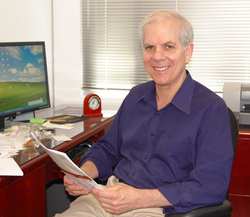Tag Archive: Stanford blood
June 24, 2011 at 2:48 pm
Published by Stanford Blood Center
By Ed Engleman, MD, Founder and Medical Director, Stanford Blood Center

During the early 1980s we decided to apply new research technology to a clinical problem: the prevention of the transmission by transfusion of Acquired Immune Deficiency Syndrome (AIDS). The problem was highly charged with social, political, legal, ethical, and economic overtones complicating the technical and medical issues at hand. In a decision that engendered intense controversy, in 1983 Stanford Blood Center instituted the first blood testing program specifically intended to reduce the risk of transfusion transmission of the then uncharacterized, but presumed infectious cause of AIDS.

June 14, 2011 at 10:52 am
Published by Stanford Blood Center
By Phillip King, long-time Stanford Blood Center platelet donor Above, Phillip is donating platelets after being the very first donor to try out our new software system for the registration process. Today’s entry is one of those gimmicky pieces...
June 6, 2011 at 8:59 am
Published by Stanford Blood Center
By Ruthann Richter, Director of Media Relations at the Stanford School of Medicine.
One of the many controversies I covered was the decision by the Stanford Blood Center to be the first in the country to test for the virus in donated blood. The move was reviled in the blood banking industry, for it called into question the safety and reliability of the nation's blood supply. The blood center later would be vindicated, as every other bank would ultimately follow suit and routinely test for HIV. Center Director Ed Engleman, MD, says Stanford's early initiative saved some 30,000 lives.
June 2, 2011 at 7:59 am
Published by Stanford Blood Center
At our May 2011 Café Scientifique, Dr. Dement discussed the importance of sleep and the consequences of sleep deprivation, narrowing in on three major sleep disorders; insomnia, narcolepsy and obstructive sleep apnea (OSA) and best treatment practices. He also shared his personal challenges with insomnia. Click here to listen to the podcast from his talk.
May 26, 2011 at 10:46 am
Published by Stanford Blood Center
By John Williams, Marketing Manager, Stanford Blood Center Tweet For several years Stanford Blood Center has given away tie dye t-shirts to blood donors as promotional items. Why? We know that the motivation for donors to give blood is obviously...
May 20, 2011 at 9:31 am
Published by Stanford Blood Center
By Billie Rubin, Hemoglobin’s Catabolic Cousin, reporting from the labs of Stanford Blood Center Tweet In Greek, apheresis means “to remove or to separate a part from the whole.” Here are a few facts from the “Core Curriculum for Nephrology...

May 17, 2011 at 9:50 am
Published by Stanford Blood Center
By Dr. Duff Howell, 277-time blood donor and counting One of my finer enduring gifts was a conversation about donating blood that I had 15 or 20 years ago. I’d said, “I never look when they put the needle in....
May 4, 2011 at 11:16 am
Published by Stanford Blood Center
by Michele Hyndman, Public Relations Manager, Stanford Blood Center Tweet I am thrilled that Stanford Blood Center is a sponsor of the inaugural Promise Walk for Northern California on May 7 to raise awareness about preeclampsia and generate funds for...
May 2, 2011 at 11:28 am
Published by Stanford Blood Center
by Julie Ruel, Social Media Manager, Stanford Blood Center Tweet When Rob Chang, marketing manager at Sports Basement, called Stanford Blood Center four years ago regarding a potential partnership, we had no idea what he would bring to our organization...
April 22, 2011 at 11:38 am
Published by Stanford Blood Center
Tweet By John Williams, Marketing Manager, Stanford Blood Center Isn’t the earth an amazing place? We abuse it every day and it still forgives us. I think we often fail to see it as a living organism. Flora and fauna...


